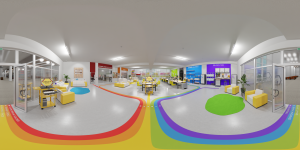Happy New Year! Looking ahead to 2023!
We have an exciting year ahead with lots in store.
Dr. Melo’s NSF-funded five-year CAREER program project, “Equity in the Making: Investing Spatial Arrangements of Makerspaces and Their Impact on Diverse User Populations,” enters the second half of year two, which will unveil a newly-designed and refined Virtual Reality (VR) makerspace. Last year, working closely with Horizon Productions, Melo and her team redesigned a VR makerspace that reflects findings that arose during the first phase observation.
As in the first phase, participants from historically underrepresented student populations in STEM fields and who have never been to makerspaces will be recruited for this phase of the program. Data will be collected via verbal reporting (i.e., think-aloud protocol) to capture real-time reactions from study participants while they walk around the VR makerspace using a HTC Vive headset or via desktop.

Newly-designed VR makerspace
The new VR makerspace is equipped with everything people would encounter in academic makerspaces, such as computers, a laser cutter, power tools, 3D printers, art supplies, a power tool workspace, a soldering station, and a sewing station with sewing machines. Special attention was paid to the space configuration, arrangement of tools and equipment, workstations, the color of the wall and rugs, signage, shape and size of furnishings, sound, and smell. All of these features are representative of the findings from phase one of the research project.
The second observation phase, which begins in Spring, will allow Melo’s team to gain further insight into why students from historically underrepresented communities shy away from makerspaces. In addition, the findings will help transform other makerspaces from typical run-of-the-mill academic makerspaces to much more inclusive, inviting, and collaborative spaces.
Within the next couple of months, we will launch our Open Educational Resource (OER) textbook, DREEAM: Designing Responsive, Equitable, and Ethical Academic Makerspaces, a how-to guide that will feature open-access publications, a public release of the VR makerspace for educators for them to use to gain insight from the communities they serve, and lesson plans for educators and information professionals. The OER’s primary purpose is to circulate the open-source VR makerspace and Melo’s research findings to encourage other STEM educators to leverage them for their use. DREEAM will be rolled out in parts. A soft pre-launch of the OER will take place via Tiny Café.
We also look forward to participating in the upcoming Inclusive Makerspace Conference hosted by the University of British Columbia, Vancouver, Canada, May 23-25. This year’s theme is the “unequivocal implementation of equity, diversity, inclusion, decolonization, anti-racism (EDIDA) frameworks for designing highly critical, responsive, and inclusive makerspaces that start with a culture that promotes equity and reduces disparities.” Dr. Melo will deliver a keynote speech entitled “Space Invaders: First-time Users Feel Like Trespassers in the Makerspace.”
Last but not least, we welcomed a new member, Jackson Brooks Barbee, to the team! Jackson is a senior studying Information Science with strong data analysis, design, and management skills. We are thrilled to have Jackson Brooks Barbee join us.

